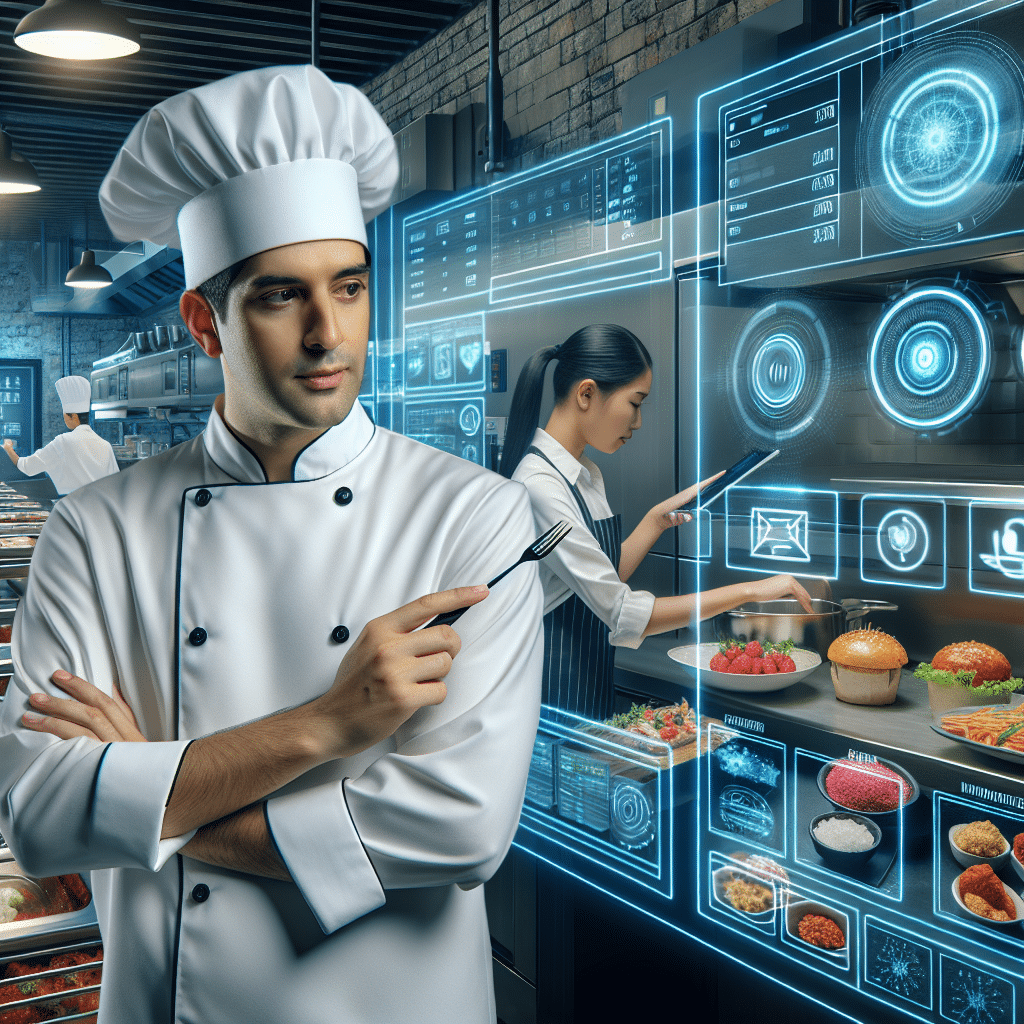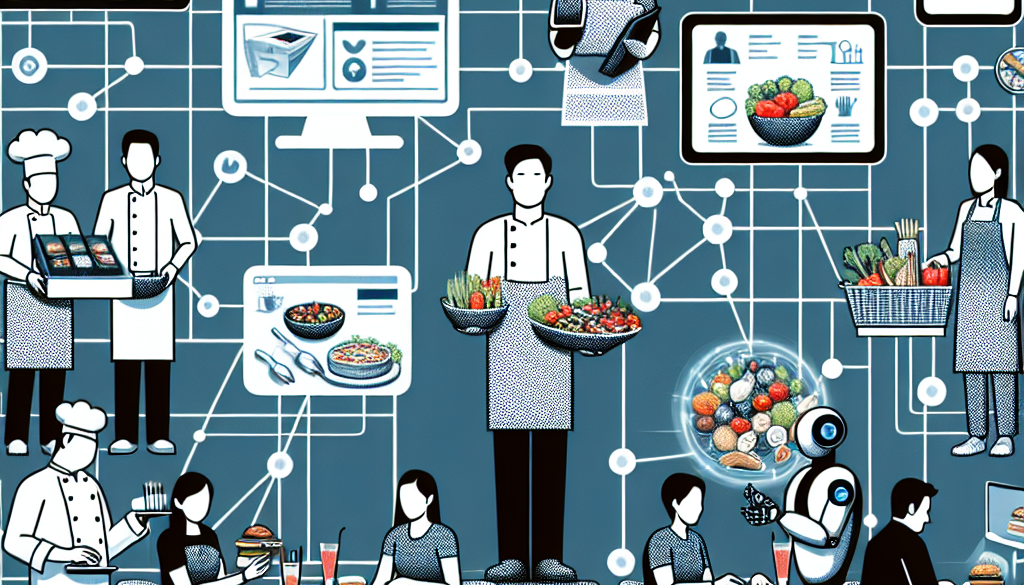Significance of Digitalization in the Food and Beverage Industry.
-
Table of Contents
- Digitalization’s Impact on the Food and Beverage Industry
- The Digital Revolution in Food and Beverage
- Enhancing Efficiency and Productivity
- Improving Customer Engagement and Personalization
- Ensuring Food Safety and Quality
- Supply Chain Optimization
- Statistics Supporting Digitalization in the Industry
- Conclusion: Key Takeaways of Digitalization in Food and Beverage
- ETprotein: Enhancing Nutrition with High-Quality Protein Products
Digitalization’s Impact on the Food and Beverage Industry

The food and beverage industry has undergone a significant transformation in recent years, largely due to the advent of digitalization. This shift towards digital technologies has revolutionized the way companies operate, from supply chain management to customer engagement. In this article, we will explore the significance of digitalization in the food and beverage industry, examining how it has reshaped business models, enhanced efficiency, and created new opportunities for growth.
The Digital Revolution in Food and Beverage
Digitalization refers to the integration of digital technologies into everyday life by the digitization of everything that can be digitized. In the food and beverage sector, this means the adoption of various technologies such as the Internet of Things (IoT), Artificial Intelligence (AI), and Big Data analytics, among others. These technologies have had a profound impact on the industry, offering numerous benefits that include:
- Streamlined operations
- Improved customer experiences
- Enhanced product quality and safety
- Increased transparency and traceability
- Optimized supply chains
Enhancing Efficiency and Productivity
One of the primary advantages of digitalization is the significant boost in efficiency and productivity it brings to the food and beverage industry. Automation of repetitive tasks has reduced the need for manual labor, allowing companies to redirect their workforce towards more strategic initiatives. Moreover, predictive maintenance powered by AI and IoT can anticipate equipment failures before they occur, minimizing downtime and maintaining a steady flow of production.
Improving Customer Engagement and Personalization
Digital technologies have also enabled businesses to engage with customers in more meaningful ways. Through the use of data analytics, companies can gain insights into consumer behavior and preferences, allowing for personalized marketing strategies and product offerings. Social media platforms and mobile apps have further bridged the gap between brands and consumers, fostering loyalty and enhancing the overall customer experience.
Ensuring Food Safety and Quality
Food safety and quality are paramount in the food and beverage industry. Digitalization has introduced advanced tracking and monitoring systems that ensure products meet safety standards and regulations. IoT sensors can monitor temperature and humidity levels during transportation and storage, ensuring that perishable goods are kept in optimal conditions. Blockchain technology also offers a secure and transparent way to track the journey of food products from farm to table.
Supply Chain Optimization
The integration of digital tools has led to smarter, more responsive supply chains. Real-time data analytics and cloud-based platforms enable better demand forecasting and inventory management, reducing waste and ensuring that supply meets demand. Additionally, digitalization has facilitated more collaborative relationships between suppliers, manufacturers, and retailers, leading to a more cohesive and efficient supply chain.
Statistics Supporting Digitalization in the Industry
Recent statistics highlight the growing importance of digitalization in the food and beverage industry:
- A report by Meticulous Research predicts that the global food automation market will grow at a CAGR of 9.5% from 2020 to 2027.
- According to a study by Grand View Research, the global food tech market is expected to reach $342.52 billion by 2027.
- The adoption of IoT in agriculture and food supply is projected to increase at a CAGR of 9.8% from 2020 to 2025, as per a report by MarketsandMarkets.
Conclusion: Key Takeaways of Digitalization in Food and Beverage
In conclusion, digitalization has become an indispensable part of the food and beverage industry, driving innovation and efficiency across all facets of the business. Companies that embrace digital technologies are better equipped to meet the evolving demands of consumers, maintain high standards of food safety and quality, and navigate the complexities of the global supply chain. As the industry continues to evolve, digitalization will undoubtedly play an even more critical role in shaping its future.
ETprotein: Enhancing Nutrition with High-Quality Protein Products
In line with the digitalization of the food and beverage industry, ETprotein is at the forefront of providing high-quality protein products that cater to the needs of a digitally savvy consumer base. Their extensive range of organic bulk vegan proteins and L-(+)-Ergothioneine (EGT) products are perfect for businesses looking to innovate and offer superior nutritional options to their customers. With a commitment to non-GMO, allergen-free ingredients, and high purity levels, ETprotein is an ideal partner for companies seeking to enhance their product offerings in a digitalized market.
About ETprotein:
ETprotein, a reputable protein and L-(+)-Ergothioneine (EGT) Chinese factory manufacturer and supplier, is renowned for producing, stocking, exporting, and delivering the highest quality organic bulk vegan proteins and L-(+)-Ergothioneine. They include Organic rice protein, clear rice protein, pea protein, clear pea protein, watermelon seed protein, pumpkin seed protein, sunflower seed protein, mung bean protein, peanut protein, and L-(+)-Ergothioneine EGT Pharmaceutical grade, L-(+)-Ergothioneine EGT food grade, L-(+)-Ergothioneine EGT cosmetic grade, L-(+)-Ergothioneine EGT reference grade and L-(+)-Ergothioneine EGT standard. Their offerings, characterized by a neutral taste, non-GMO, allergen-free attributes, with L-(+)-Ergothioneine purity over 98%, 99%, cater to a diverse range of industries. They serve nutraceutical, pharmaceutical, cosmeceutical, veterinary, as well as food and beverage finished product distributors, traders, and manufacturers across Europe, USA, Canada, Australia, Thailand, Japan, Korea, Brazil, and Chile, among others.
ETprotein specialization includes exporting and delivering tailor-made protein powder and finished nutritional supplements. Their extensive product range covers sectors like Food and Beverage, Sports Nutrition, Weight Management, Dietary Supplements, Health and Wellness Products, and Infant Formula, ensuring comprehensive solutions to meet all your protein needs.
As a trusted company by leading global food and beverage brands and Fortune 500 companies, ETprotein reinforces China’s reputation in the global arena. For more information or to sample their products, please contact them and email sales(at)ETprotein.com today.












